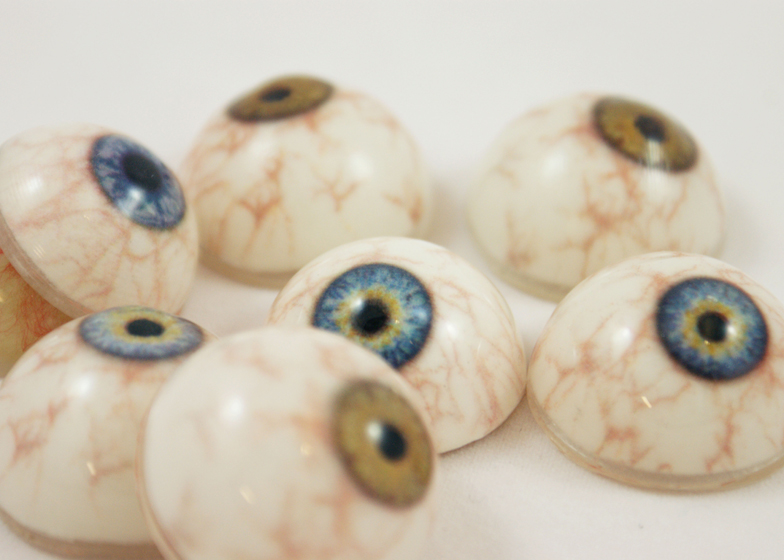News: British company Fripp Design and Research has developed 3D-printed prosthetic eyes that could be produced much faster than existing handmade versions, reducing the cost by 97 percent.
Fripp Design and Research, which is also working on 3D-printed ears and noses for patients with facial disfigurements, has collaborated with Manchester Metropolitan University to develop ocular prosthetics that are 3D-printed in batches, with intricate coloured details including the iris and blood vessels already included.
Currently, prosthetic eyes are moulded in acrylic and painted by hand to match the patient's eye colour. This process is time-consuming and expensive, whereas producing the eyes using a 3D printer enables up to 150 eyes to be made in an hour.
"To hand-make a prosthetic eye takes between four and eight hours depending on the individual painting the eye," the company's founder Tom Fripp told Dezeen. "Because only one eye can be done at a time, the waiting time in the UK for an eye is approximately ten weeks. With our system we can 3D print up to 150 in one hour and post process approximately five per hour, each one different."
All of the components are printed from powder in full colour using a Z-Corp 510 machine before the resulting form is encased in resin. Compared to the existing handmade production method, this helps to remove any variation in quality and significantly reduces the cost of each eye, which is currently up to £3000 in the UK.
"Because each one is produced from the same system the consistency is the same and the cost is drastically reduced to approximately £100," said Fripp.
By printing eyes in batches, each with a slightly different hue, Fripp pointed out that it is possible to accurately match the look of the prosthesis to the patient's existing eye: "Although we have not perfected colour matching yet, because we can print so many in such a short space of time the colour change between each one is so slight that the chances of getting a good match is very good."
The eyes are available in small, medium and large sizes and Fripp claimed that accurate reproduction of existing eyes is the next stage for the product's development: "The technicality in customising an iris is very demanding and although we haven't perfected it yet, we are working on it!"
Speaking to Dezeen at the 3D Printshow in London earlier this month, Fripp said the project was at an advanced stage of development and should be ready to implement "within 12 months."
He added that there had been strong interest from India, where less advanced surgical procedures result in a high number of patients losing their eyes. "Because of the high number of relatively poor individuals in the country, they tend to simply go without," said Fripp "However, our system will allow them to purchase a prosthesis."
Images are courtesy of Manchester Metropolitan University and Fripp Design and Research.

